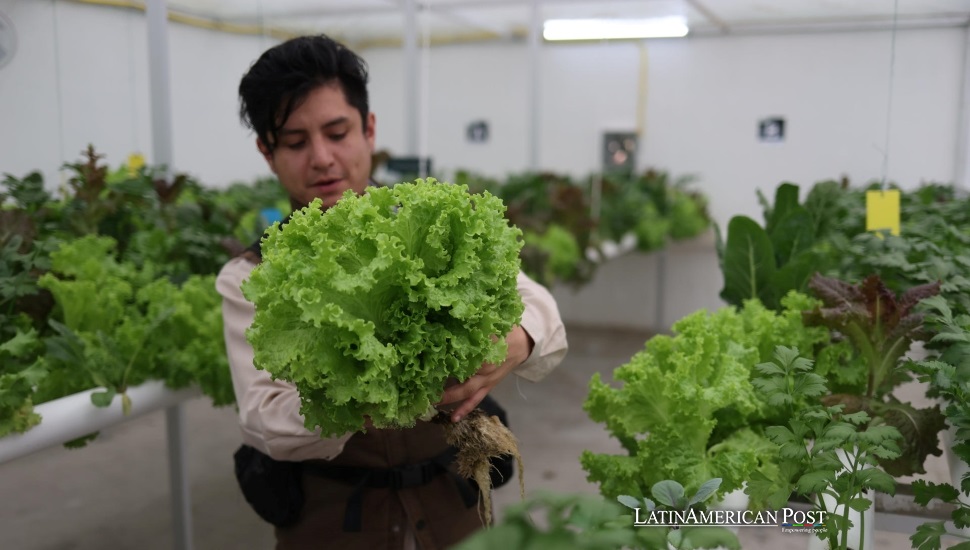Smart Hydroponic Gardens in Bolivia Transform Urban Agriculture

Bolivia’s first “Smart Educational Garden” blends hydroponic technology with education, empowering schools to grow fresh produce sustainably. This project, led by young innovators, showcases how technology can revolutionize agriculture and contribute to urban areas’ food security and climate resilience.
Revolutionizing Urban Agriculture Through Technology
The “Huerto Smart Educativo” (Smart Educational Garden) in La Paz, Bolivia, is a pioneering project combining technology and hydroponic farming to address food security challenges and climate adaptation in urban settings. What sets this project apart is its innovative use of technology to turn schools into productive agricultural spaces. The garden uses hydroponic methods, allowing plants to grow without soil using a nutrient-rich water solution.
Created by a group of young innovators from Movimiento Propacha and Cruz Verde La Paz Srl., this project is a model for sustainable farming and a beacon of how technology can drive change in agriculture. The garden, established with the support of the World Wildlife Fund (WWF) and other partners, aims to demonstrate how technology can enhance productivity, minimize environmental impact, and engage students in hands-on learning about food systems and sustainability.
Through an intelligent system developed by Cruz Verde, the garden integrates automation and remote monitoring, ensuring optimal growth conditions while requiring minimal manual intervention. This technological approach makes the project scalable and adaptable to other urban environments.
Cerebelum: The Brain Behind the Smart Garden
At the heart of the project is the Cerebelum system, a technological innovation that acts as the brain behind the garden’s operations. Developed by Cruz Verde, the Cerebelum allows users to remotely control all aspects of the hydroponic garden from their mobile devices. The system manages essential functions like lighting, ventilation, and water pumping, ensuring the plants receive the proper nutrients and light at the correct times.
“This technology enables us to control the environment remotely, reducing the need for constant physical monitoring,” explained Félix Angulo, general manager of Cruz Verde. The Cerebelum also allows for real-time adjustments, ensuring that any issues, such as water leaks or temperature fluctuations, are quickly addressed. By automating much of the process, the system makes it possible for schools to manage the gardens with minimal effort, allowing students to focus on learning rather than the logistical challenges of farming.
In addition to controlling environmental factors, the Cerebelum can suggest optimal schedules for lighting and watering, improving the garden’s overall efficiency. Future updates to the system will include sensors to monitor conditions in even greater detail, further reducing the potential for human error and maximizing the garden’s productivity.
The Role of Hydroponics in Sustainable Urban Farming
Hydroponics is another critical technological aspect of the “Huerto Smart Educativo.” Hydroponic farming is a method of growing plants without soil, using nutrient-enriched water as the growing medium. This technique reduces the amount of space required for farming and conserves water, making it an ideal solution for urban environments where space and resources are limited.
Hydroponics offers several advantages over traditional soil-based farming. Plants grown hydroponically tend to grow faster and yield more produce because they have constant access to nutrients and water. The closed-loop system used in hydroponic gardens also minimizes water waste, as excess water is recirculated rather than lost to the ground.
In the case of the Smart Educational Garden, hydroponics allows the students to grow a variety of crops, including lettuce, basil, and celery, in a small, controlled environment. The garden can produce up to 1,500 plants at a time, providing fresh, healthy food to the local community while teaching students valuable lessons about agriculture, technology, and sustainability.
Scaling the Technology for Greater Impact
The success of the first two Smart Educational Gardens in La Paz has inspired the team to expand the project. The goal is to establish 100 intelligent gardens across schools, elderly care homes, and orphanages, thereby doubling locally produced food. This ambitious expansion plan reflects the team’s confidence in the scalability of their technology.
One key benefit of the Cerebelum system is its adaptability. The technology can be easily installed in other urban gardens, allowing cities to adopt this model of sustainable agriculture quickly. By integrating technology with local food production, the project aims to reduce dependency on imported food, lower transportation costs, and contribute to the local economy.
“The idea is to use technology to transform Bolivia’s agriculture,” said Angulo. “We want to make these leaps with the help of the internet and institutions to bring this technology to the population faster. Instead of waiting ten years for prices to drop, we are developing the technology ourselves with local materials.”
The team also plans to refine the Cerebelum system, adding more sensors and automation features to improve efficiency. This will allow precise control over the growing environment, increasing productivity and reducing waste.
A Model for the Future of Urban Agriculture
The Smart Educational Garden in Bolivia serves as a model for how technology can transform urban agriculture. By combining hydroponics with advanced automation systems like Cerebelum, the project has demonstrated that producing large quantities of food in small urban spaces is possible while minimizing resource use.
As cities worldwide grapple with the challenges of food security and climate change, projects like this offer a glimpse of the future of agriculture. By growing food sustainably in urban areas, cities can become more self-sufficient, reducing their reliance on external food sources and contributing to global efforts to combat climate change.
For Bolivia, this project is just the beginning. By continuing to develop and expand the Smart Educational Garden model, the country has the potential to become a leader in urban agriculture and show the world how technology and innovation can solve some of the most pressing challenges of our time.
Also read: Mexico’s Oaxaca Cathedral Shines with Eco-Friendly Lighting Innovation
The Smart Educational Garden is more than just a technological achievement; it is a testament to the power of youth-driven innovation. By empowering young people to take control of their food systems and use technology to improve sustainability, Bolivia is paving the way for a brighter, more resilient future.





